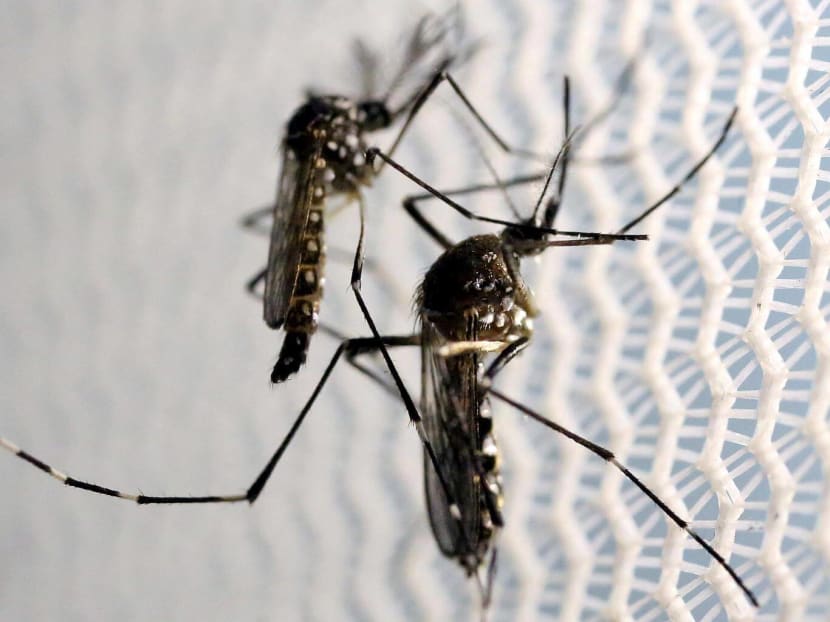Chinese scientists’ new technique to wipe out mosquito populations may provide vital new weapon against range of deadly diseases
GUANGZHOU (China) — Scientists have wiped out the entire population of mosquitoes on two islands in southern China using radical techniques to render the males infertile, according to a new study that could transform the fight against a range of deadly diseases.

GUANGZHOU (China) — Scientists have wiped out the entire population of mosquitoes on two islands in southern China using radical techniques to render the males infertile, according to a new study that could transform the fight against a range of deadly diseases.
Over nearly two years, scientists released more than 200 million specially bred male Asian tiger mosquitoes on Shazai and Dadaosha islands in the delta to the south of Guangzhou city, the area with the highest number of dengue fever cases in China.
The study, published in the latest edition of the journal Nature, said the mosquitoes, also known as Aedes albopictus, had been exposed to short bursts of gamma radiation and received three artificially induced infections from three different species of Wolbachia, a parasitic microorganism, to make them infertile.
The males were also fed with sugar in the hope of making them bigger and stronger – and therefore more attractive to female mosquitoes during the mating season.
This, combined with the sheer weight of numbers of the infertile mosquitoes, was intended to tip the evolutionary balance by ensuring that the females’ eggs – if any were laid at all – would not hatch.
By the end of the two-year experiment, the native mosquito populations on the islands had vanished completely.
The scientists did find a few individual mosquitoes still living on the islands in Guangdong province, but genetic analysis suggested their origins lay elsewhere and they had probably been carried there by cars or by ships.
Although Asian tiger mosquitoes – so named because of their distinctive white stripes – can transmit a range of diseases, including the Zika and West Nile viruses as well as dengue fever, a lot of locals were initially sceptical about the project.
The research was led by Professor Xi Zhiyong from the Sun Yat-sen University-Michigan State University Joint Centre of Vector Control for Tropical Diseases, with official support from the Guangzhou Centre for Disease Control and Prevention.
The study said that in the beginning, only 13 per cent of the people on Shazai island had supported the work.
The researchers had released more than 140 million of the insects on the 3 sq km (1.9 square mile) island – which equated to 72,000 mosquitoes for every one of its 2,000 or so residents – and even thought the males do not bite, many locals felt uncomfortable about having so many released into their neighbourhood.
But by the end of the experiment, opinion polls showed that almost all the locals supported – or at least did not oppose – the project after the number of bites recorded fell by more than 96 per cent.
“In the past there were so many mosquitoes we dared not stay outside in late afternoon. Now mosquitoes can barely be seen and those few remaining rarely bite,” a Shazai restaurant owner surnamed Li said in a phone interview on Wednesday.
“The technology is a miracle. We used to be sceptics. Now we are fans.”
The government-run mosquito-breeding facility in Guangzhou province can produce 10 million modified males a week, but the ecological impact of this and other similar projects poses a potential dilemma for scientists.
Mosquito larvae is an important source of food for fish while the fully grown insects also serve as prey for birds.
But a survey conducted by Nature in 2010 suggested that most biologists would prefer to see mosquitoes wiped off the Earth because they carried a lot of deadly diseases.
Mosquitoes kill more than 700,000 people around the globe each year, according to some studies, which makes them the most deadly creatures of all for humans.
Mosquito-borne diseases include malaria, dengue and yellow fever, Japanese encephalitis and the Zika virus, which has spread in recent years and is linked to a range of birth defects.
But Professor Ge Feng, director of the state laboratory of integrated management of insect and rodent pests at the Chinese Academy of Sciences in Beijing, said he fully supported the Guangzhou study.
“Mosquitoes have no place in human-populated areas. The harm they do far exceeds the benefits to the ecological system,” Prof Ge said.
The artificially bred mosquitoes will only have an impact in limited areas, and the insects will continue to thrive in the wild, he said.
Prof He Jinsheng, a professor of ecology at Peking University, said the gap in the food chain caused by breeding-suppression techniques would “quickly, easily be filled by other, non-biting insects” and “the negative impact will be minimal”.
He argued that compared with other mosquito control methods such as the use of chemical pesticides and insect repellents, the biological approach from the Guangzhou project might be the least harmful to the environment. SOUTH CHINA MORNING POST






